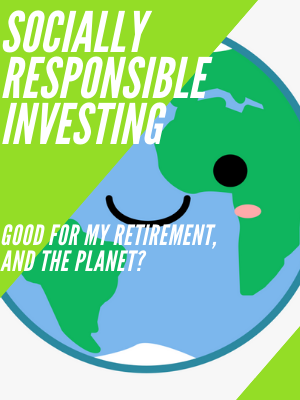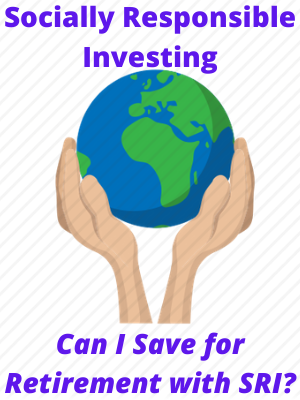Can Personal Values Help Us Invest in Our Retirement?
like many Americans, I try to put money aside for my retirement. My investments are modest but they feel important because, well, I worked hard for the money I’m able to put aside and also, whatever I invest represents security for my husband and I in our retirement. But is it possible to create a nice nest-egg and stay true to my values — to not invest in industries that do harm and invest in industries that do good??
What is Socially Responsible Investing?
Socially responsible investing (SRI) is investing that supports values like human rights and environmental sustainability and avoids industries that negatively affect the environment and its people. In practice, SRI means staying away from industries that could include alcohol, tobacco, gambling and weapons, fossil fuels, pesticide or pharmaceutical companies. There is no official qualification or definition for SRI, and each of us has different values, but SRI generally involves investing in companies engaged in ethical and socially conscious themes like environmental sustainability and social justice. Some investors also consider SRI to stand for sustainable, responsible and impact investing. Regardless of your preferred definition, socially responsible investing works toward both positive change and financial gain.
SRI and Eco-Investing have received recent media attention because BlackRock Inc, the world’s largest asset manager, with $7.4 trillion in assets, announced in January a shift towards Eco-Investing in particular. BlackRock has made a clear commitment to put sustainability at the heart of its investment decisions. In his annual letter to chief executives, BlackRock boss, Larry Fink, wrote that the climate emergency is altering how investors view the long-term prospects of companies. “Awareness is rapidly changing, and I believe we are on the edge of a fundamental reshaping of finance.”
According to Investopedia, SRI analysts gather information on industry practices and analyze these in the context of political, economic and social concerns. These seven areas are usually the focus of socially responsible investors:
- Corporate governance and ethics
- Workplace practices
- Environmental concerns
- Product safety and impact
- Human rights
- Community relations
- Indigenous peoples’ rights
SRI is possible for stocks and bonds as well as mutual funds but requires research, either on your own or with the assistance of an advisor, and a defined set of values which the investor chooses to pursue.
What is Eco Investing/Green Investing?
Eco-investing or green investing focuses on companies that offer environmentally friendly or sustainable products and practices. These companies encourage new technologies that support the transition from carbon dependence to more sustainable alternatives. Green investments focus on companies or projects committed to the conservation of natural resources, the production and discovery of alternative energy sources, the implementation of clean air and water projects, or other environmentally conscious business practices. Green investments may fit under the umbrella of SRI, but they are fundamentally more specific.
Is This Type of Investing New?
Advocates for SRI point to its roots dating back more than 200 years to money management practices of the Methodists. Others suggest this goes back to the ideas long championed in Sharia investing. The Balance outlines this historical perspective in their article The Origins of Socially Responsible Investing from the 1960’s until today.
Not New, but Growing Fast
BlackRock outlines on their website how the number and diversity of investors looking to SRI are on the rise for several reasons:
- The next generation of financial decision-makers are asking more of companies than the bottom line and are looking for sustainable investment solutions.
- Regulators and governments are expanding their focus on incorporating sustainability into investment information and decision making.
- There is growing recognition that evolving Environmental, Social and Governance (ESG) realities can potentially identify investment risks or returns.
How does a person practice SRI?
Avoid and Advance Strategies can help us when we’re talking to our financial advisor.
- “Avoid” strategies involve the elimination of certain companies or sectors that are associated with increased ESG risk or which violate the asset owner’s values. For me personally, I avoid investments in companies that produce opioid drugs, health insurance companies and the fossil fuel industry Note, I am not giving advice here, I have no expertise in investing, I’m only giving an example of how I personally choose to avoid certain industries.
- “Advance” strategies focus on proactively supporting positive ESG characteristics to align capital with certain behaviors or target specific positive social or environmental outcomes. For me personally, I ask my advisor to look for ways that I can put my modest investment dollars into green energy and Eco-technology because I think it’s the right direction for humanity and the planet – Again, I’m not giving financial advice, just an example of how I engage in the Advance strategy.
Below is an excellent episode from The Daily , a podcast produced by the NYTimes on the impact of BlackRock’s annual letter on corporations like Amazon, Delta Airlines and Microsoft. What’s fascinating and encouraging to me about this is that it shows so clearly just how much influence Larry Finks’ message has on our largest corporations, corporations big enough to influence the daily lives of the rest of us!
What’s the Smart way to Explore SRI?
- Meet with a reputable fiduciary advisor. A fiduciary advisor does not work on commission like other types of financial advisors do.
- Ask them what options they can suggest for SRI and Eco investing within the budget that you have to invest.
- Measure the risk analysis between suggested SRI / Eco investing and conventional investments.
- Do what you feel is right for you with the guidance of your fiduciary advisor.
Prudent Advise from my Advisor
It probably isn’t surprising that my own advisor is much more prudent than I am with SRI, and especially Eco investing – his advice to me is to stay prudent and “don’t go all in” at once. The challenge is that it’s difficult to connect the dots between sustainable technology and profits. Saving the planet isn’t your traditional business model, there aren’t guaranteed ways to build industry, create jobs and generate profit with sustainable energy, these need to be creatively developed. For example if solar or air power generating systems last for 15-30 years without maintenance, there isn’t the continuous revenue stream for a company as there is for oil and gas – your car runs out of gas and you buy more, but if your car batteries run low you re-charge, you’re not purchasing anything or employing anyone to do that. His advice to me is to, as I mention above, decide what values are most important personally and to “dabble” with SRIs with prudence.
Can SRI Save the World?
The impact that BlackRock letter seems to have had on gigantic companies like Amazon, Delta Airlines and Microsoft makes me even more sure that we have hit a wall with environmentally destructive investment. At the end of the day we can’t breath, drink, eat or be sheltered by fossil fuels. So it makes sense that what is environmentally sustainable will be, at least in the long-term, also financially sustainable. If I can help empower innovation and technology which helps clean up the world with my modest investments I do feel like I’m part of a solution, a movement in the right direction, which all of humanity will benefit from.






